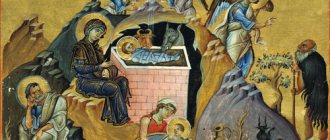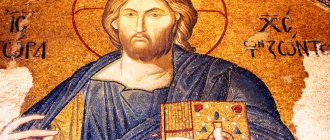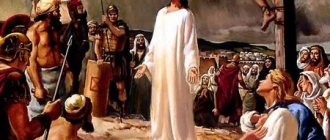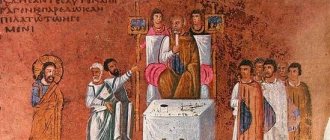Archpriest Vladimir Puchkov tells.
Every priest, regardless of education, place of ministry and number of flocks, has to answer elementary questions. When you hear and don’t understand, the questioner is joking, mocking, or really doesn’t know. Moreover, both a non-church person and a regular parishioner can ask such a question. For example, not long ago I was asked, “What does the name Jesus Christ mean?” It would seem that what could be incomprehensible here? But no, as I later discovered, not without surprise, even among believers who have been attending church for years, there are those who believe that we call the Savior by his first and last name...
After something like this, I’m no longer surprised when I hear “what does Jesus Christ mean” or “why is Jesus Christ called the Savior”? That’s why I thought it was better to write once than to talk about the same thing several times.
What does the name Jesus Christ mean?
The name of Jesus Christ carries the deepest meaning, being a kind of short symbol of the Christian faith. Jesus is a name, the Greek form of the Hebrew word "Yeshua", which means the help of God, or Savior. Christ is a title, a Greek word meaning “Anointed One”, in Hebrew it sounds like Mashiach - Messiah.
In ancient Israel, kings, high priests and prophets were called anointed, due to the fact that they were anointed for service with a special consecrated ointment. Through this sacred act, God's blessing was brought down upon man.
In carrying out His public ministry, Christ acted both as King, and as High Priest, and as Prophet. As a King, He exercised power over the elements, cast out demons, and performed signs and wonders. As a High Priest, he sacrificed himself on the Cross, and as a Prophet, he proclaimed the will of God, denounced evil, and initiated him into the secrets of the future. However, unlike the Old Testament anointed ones, Christ was anointed not with the material world, but directly with the Holy Spirit, and in Him dwelt “the fullness of the Godhead bodily” (Col. 2:9).
Jewish high priest
The second highest priest mentioned in the Bible was born in captivity among the Babylonians and raised in the hope of returning the people to the land of Israel. After King Cyrus issued the decree of liberation as recorded in the Book of Ezra, he, like his ancient namesake, led his people upon his return.
He became the first of its chief clerics. His whole life was devoted to improving the life of Jews: both civil and religious. He especially put a lot of effort into restoring the Jerusalem Temple.
Who is Jesus Christ?
1) Jesus Christ is the Son of God incarnate, one of the Persons of the Holy Trinity, God the Word. According to His Divine nature, the Son is born in eternity (outside the conditions of time) from God the Father (by analogy: just as a word is born from the mind, radiance from light, dew from fog).
In fulfillment of the will of the Father, the Son of God assumed human nature into His Hypostasis (1 John 4:9). The perception of human nature by God's Word occurred at the very moment of supernatural conception, in the womb of the Blessed Mary. Then the flesh of Jesus Christ, animated by the rational soul, received its existence. Thus, through the union of two natures, Divine and human, in one Person, the Son of God, without ceasing to be God, became a Perfect Man, like us in everything, with the exception of sin (Heb. 4:15).
The divine and human natures are united in the Hypostasis of Jesus Christ, unfused, immutable, inseparable and inseparable. This means that neither the Divine nor the human nature, as a result of the union, underwent the slightest change; they did not merge and did not form a new nature; will never separate. Since the Son of God is not only God, but also Man, He also possesses two wills: Divine and human. At the same time, His human will agrees with the Divine will in everything.
2) According to His human nature, Jesus Christ is the Son of the Most Holy Theotokos, a descendant of the king and prophet David. His conception took place without the participation of her husband’s seed and without violating the virginity of Mary, which She preserved both at the Birth and after the Birth of the Son.
Why did Christ appear?
As is known, the Good God “created man for incorruptibility and made him the image of His eternal existence” (Wis. 2:23). But man resisted the will of the Creator, and “sin entered into the world, and death through sin” (Rom. 5:12). As a result of the Fall, corruption affected not only the human conscience, but also the human essence itself. Man could no longer give birth to holy and sinless descendants; he became prone to evil, susceptible to the influence of fallen spirits: “Oh, what have you done, Adam? When you sinned, it was not only you who fell, but also us who come from you” (3 Ezra 7:48). The Fall “perverted all the powers of the soul, weakening its natural attractions to virtue” (St. Gregory of Sinai).
Man could only get rid of the power of sin only through the special intervention of Almighty God. And so, revealing His boundless love for mankind, God sends His Son into the world (John 3:16).
How did Christ deliver man from the power of sin, the corruption of death and the devil?
Coming out to preach at the age of thirty, Christ taught by word and example. Confirming His Divine mission and dignity, He more than once performed miracles and signs, including healings from illnesses and resurrections. The apogee of the ministry was the sacrifice of Himself on the Cross in atonement for sins: “He Himself bore our sins in His body on the tree, so that we, having been delivered from sins, would live for righteousness: by His stripes you were healed.” (1 Peter 2:24-25)
Having voluntarily accepted the Passion of the Cross and death, the Son of God descended in soul to hell, bound Satan, destroyed the souls of the righteous and, trampling death, was resurrected. Then He repeatedly appeared to His disciples and on the fortieth day He ascended to Heaven, paving the way to the Kingdom of God for all who would follow Him. On the Day of Pentecost, the Holy Spirit descended on the apostles, who has been continuously present in the Church since then. By joining the Church of Christ and living an active church life, a person draws closer to God, is sanctified, deified, and as a result is rewarded with eternal blissful life in Heaven.
How Christ confirmed that He is both God and Man
As God, Jesus Christ openly declares His Divine nature. He says: “He who has seen Me has seen the Father” (John 14:9), “I and the Father are one” (John 10:30), “no one knows the Son except the Father; and no one knows the Father except the Son, and to whom the Son wants to reveal it” (Matthew 11:27). To the question of the Jews, “Who are you?” He answers: “He was from the beginning, just as I told you” (John 8:25). Speaking to them about Abraham, He says: “Truly, truly, I say to you, before Abraham was, I am” (John 8:58).
But He also calls Himself the Son of Man. One can and should speak of Him as a man, with the exception of one difference - He is a perfect man, for He has no sin. The human nature of Jesus Christ is consubstantial with ours, but it is completely free from original sin. In Him human nature is again revealed in all its innocence and purity. His human nature is permeated by the Divine, transformed and completely unrelated to sin.
***
Successor of Moses
If you follow the chronology of the presentation of the Holy Scriptures, then Joshua should be noted first. He was the successor of the prophet Moses in governing the people of Israel. He descended from the tribe of Ephraim and was originally called Hosea.
This personal name coincides in meaning with the second part of the name Jesus and also means “salvation”, that is, God is not explicitly mentioned in its composition. He was renamed Moses, which was a sign of his future mission.
It was through him that the Jews were saved by the Almighty from the disasters that threatened them during their wanderings and led to the Promised Land. He is spoken of in a Book with a title corresponding to his name.
No one in the world has been spoken about as much as Jesus Christ.
Not a single person on earth has been or is being spoken about as much as is said about Jesus Christ. In each of the more than four million Christian churches and houses of worship, a sermon about Christ is heard. Professors from university departments talk about Him, students write essays about Him, they talk about Him, argue about Him, they admire Him, they criticize Him. The name of Jesus Christ has not left our lips for two thousand years; no other name on earth has been uttered so often.
There is not as much written about a single person as has been written and written about Jesus Christ. In addition to the Gospels, information about Him is contained in many other books, both fiction and scientific. They write about Him in newspapers and on the Internet; every year thousands of dissertations are defended in different countries on various aspects of His life or teachings.
Variations
Similar to the name in question, in addition to the already mentioned Yehoshua, are the following:
- Jesus;
- Yeshua;
- Jizes;
- Joshua;
- Josué;
- Jesus;
- Yesus;
- Gesu;
- Hyisa;
- Isa.
Isa, which can also sound like Khyisa, is used by Muslims. He refers to one of the greatest prophets in Islam. He is identified with Jesus Christ, but not in all respects. Prophet Isa was sent to the Israelis by Allah to confirm the truth of the Taurat (that is, the Torah).
And also in order to bring them one of the sacred Islamic books Injil (a parallel with the Gospel) and establish a new Law. As the Koran narrates, Isa was not crucified, but by Allah he was taken to heaven alive.
It should be noted that the name Jesus, like its variants indicated, is not popular. Most often it can be found in Latin American countries, Spain and Portugal. The Spaniards also have a female form - Jesusa.
Next we will talk about characters known from the Bible.
There was no other person who had such a profound influence on the development of culture
There was no other person in history who had such a deep, comprehensive and fertilizing influence on the development of human culture. It was Jesus Christ who set the vector of cultural development of several continents for many centuries. Having begun in the Middle East, Christianity very quickly spread throughout Asia Minor and North Africa, then spread to Eastern and Western Europe. Subsequently, Christian civilization covered both Americas, Australia, a significant part of Africa and Southeast Asia. And in each of these regions, Christianity had a huge, in many cases decisive, influence on the development of culture and shaped the cultural codes of entire nations.
Not a single person in history can compare with Jesus Christ in the number of paintings dedicated to him. The total number of images of Christ placed in churches, including scenes from His life, amounts to tens of millions. Add to this all the works of world painting and sculpture dedicated to him, their numerous reproductions on postcards and albums - we can talk about billions of such images.
No single person has had so many pieces of music dedicated to him, from early Christian liturgical music to numerous cantatas and J. S. Bach's majestic Passion. The image of Jesus attracts composers from different countries, times and peoples.
Salvation in Christianity
In Greek this term is written as σωτηρία. In the Bible, in the Christian tradition, it is interpreted as follows. We are talking about delivering people from sins and their consequences, which are death and hell. Through salvation, a person gains the Kingdom of Heaven. In the Holy Scriptures in different places the word “salvation” can be used to mean:
- healing;
- getting rid of personal enemies and physical danger;
- liberation from political oppression.
Christian theologians consider salvation to be an action of God, resulting from his love for people.
Thus, the translation of the name Jesus corresponds to the concept of “Savior”, and it can also be literally translated as “God is salvation.”
The influence of Jesus Christ on the moral condition of mankind is unprecedented
No person can be compared with Jesus Christ in terms of influence on the development of morality. Despite His complete absence of any traits of a social reformer, His teaching over the centuries became the cause of profound radical changes in the entire system of relationships between people, not only at the level of personal morality, but also at the social level. Let's give examples. Jesus did not call for the abolition of slavery, but it was because of the Christian understanding of the natural equality between people that slavery was eventually abolished. He did not call for a change in the political regime or reform of the legal code, but it was thanks to Christianity that the human community created those legal mechanisms that today underlie the life of many states. Jesus was not a fighter for social rights, but it is on Christian teaching that the understanding of human rights is based, which allowed women and children to become full members of society, allowed to eradicate inequality in public rights, discrimination on national and racial grounds and many other defects of the social structure characteristic of ancient world.
Son of Sirach
Quite little is known about him. He lived in Jerusalem and left behind a collection of wise sayings of an everyday nature. They are written in Hebrew. The short title of the collection is Sirakhov's Book. The original of this book has not survived, but there is a Greek translation of it, which was made by the author’s grandson. The latter moved to Egypt around 235 BC. e. during the reign of Ptolemy Euergetes. The Russian Bible contains its translation from Greek.
It is placed after the books of Solomon, with which it has a close relationship. Despite the fact that the work bears traces of Greek influence, it reveals the author’s close acquaintance with the laws of Moses and the prophets. It is permeated by their spirit, which the son of Sirach strives to bring into the family and social relations of the people.
Jesus Christ is fundamentally different from the prophets of other religions
Jesus Christ is the only Man whom many have revered as God incarnate for two thousand years. In many religious traditions, there are individuals who are revered as prophets or as great teachers (eg, Mohammed, Buddha, Confucius), but there is no other individual who is revered as God or prayed to as God.
There are many other examples of the influence of Jesus Christ on the development of human civilization in its most diverse aspects. But the examples given are quite enough to understand the reasons why the birth of this particular Man became the starting point in our calendar, and why He is the most famous Man in the entire history of mankind. On a global scale, Jesus Christ has no competitors in terms of the amount of influence he has on the minds and hearts of people, on their personal and social lives, on their ideological and moral attitudes.
***
The Holy Fathers of the IVth Council of Chalcedon, who gathered in 451 in the number of about 630 participants, defined the dogma about the image of the union in the Person of the Lord Jesus Christ of two natures in the following words:
“Following the Holy Fathers, we all unanimously teach to confess one and the same Son of our Lord Jesus Christ, perfect in Divinity and perfect in humanity, truly God and truly man, the same from the rational soul and body, consubstantial with the Father in Divinity, and the same consubstantial to us according to humanity, in everything like us except for sin, born before the ages from the Father according to Divinity, and in the last days for our sake and for the sake of salvation from Mary the Virgin Mother of God - according to humanity; one and the same Christ, the Son, the Lord, the only begotten, in two natures, unfused, unchangeably, inseparably, inseparably cognized - so that by the union the difference of the two natures is in no way violated, but all the more the property of each nature is preserved and united into one Person and one Hypostasis , - not into two persons cut or divided, but one and the same Son and Only Begotten, God the Word, the Lord Jesus Christ, as the prophets of ancient times taught about Him, and as the Lord Jesus Christ Himself taught us, and as the symbol of the fathers gave us.” .
Dogma of the One Hundred and Seventy Holy Fathers of the VI Ecumenical Council of Constantinople. About two wills and actions in our Lord Jesus Christ:
“We also preach, according to the teaching of the holy fathers, that in Him there are two natural wills or desires, and two natural actions, inseparably, unchangeably, inseparably, unmerged. And two natural desires are not opposed to one another, as the wicked heretics said - let it not be! But His human will does not contradict or oppose, but follows, or better said, submits to His Divine and omnipotent will.”
***
Stop talking about Christ. Start talking to Christ. Stop thinking of Christ as something external, distant. Find Him within yourself. Don’t invent Christ for yourself, let Him tell you about Himself. Don't try to save yourself. Let Him save you. He longs to care for you, to comfort you, to guide you; you just let Him do it by moving your self out of His way. All that is needed from you is just to look in His direction and whisper: “My Christ, save me.” Archpriest Sergius Baranov (Orsk)
Why is Christ called Savior?
Having answered the elementary questions, let’s move on to those for which the answer is completely obvious. Why is Jesus Christ called the Savior by the Church? It must be said that the obviousness of the answer here directly depends on whether a person reads the Bible. Holy Scripture paints us a very clear picture of the fall of the first people. The main consequence of the fall was death. And let the ancestors not die immediately, but, on the contrary, live after being expelled from paradise for almost a thousand years. Death, of course, befell them, only this death was spiritual. In bodily death the soul leaves the body; in spiritual death the soul is separated from God. Notice: Adam and Eve, who previously spoke with God face to face, having sinned, hide from Him. The evil committed by man, the evil that dwells in man, becomes an insurmountable barrier between man and God. Meanwhile, having appeared to Moses in the Sinai desert, it was not for nothing that God called himself “He Who Is,” “The Existing One.” Only God alone has existence; all created beings have existence from God, Who is the source of universal existence. Thus, the Fall became spiritual death for the first parents, and in their person for all humanity. Born with the seed of evil in their souls, people lived with it all their lives and, unable to get rid of it, after death they went to hell. Christ, by His death on the Cross, descent into hell, liberation of righteous souls and resurrection from the dead, resurrected the spiritually dead human race. In other words, he saved a person from spiritual death. Therefore, asking “why is Jesus Christ called the Savior” will be approximately the same as “why is Jesus Christ called God”? Because He is. And nothing else.
I hope we have dealt with the elementary and obvious. In fact, it is not surprising that such questions are periodically asked both by priests and ordinary believers. Only believers can speak freely on topics related to faith. For everyone else, they will be fraught with a lot of questions, bewilderments and incomprehensibility. And what is obvious to us, believers, may seem unknown, incomprehensible, new to many, many. So even the simplest questions should be answered. In the end, almost all of us asked similar questions ourselves, some during the period of churching, some in childhood. And they took them quite seriously and were glad to receive an answer. In the meantime, no less simple answers have been found to the next simple questions, I recommend asking yourself a more difficult question: what does it mean to be a disciple of Jesus Christ? Let everyone find the answer for themselves first, and then we will return to it here.










